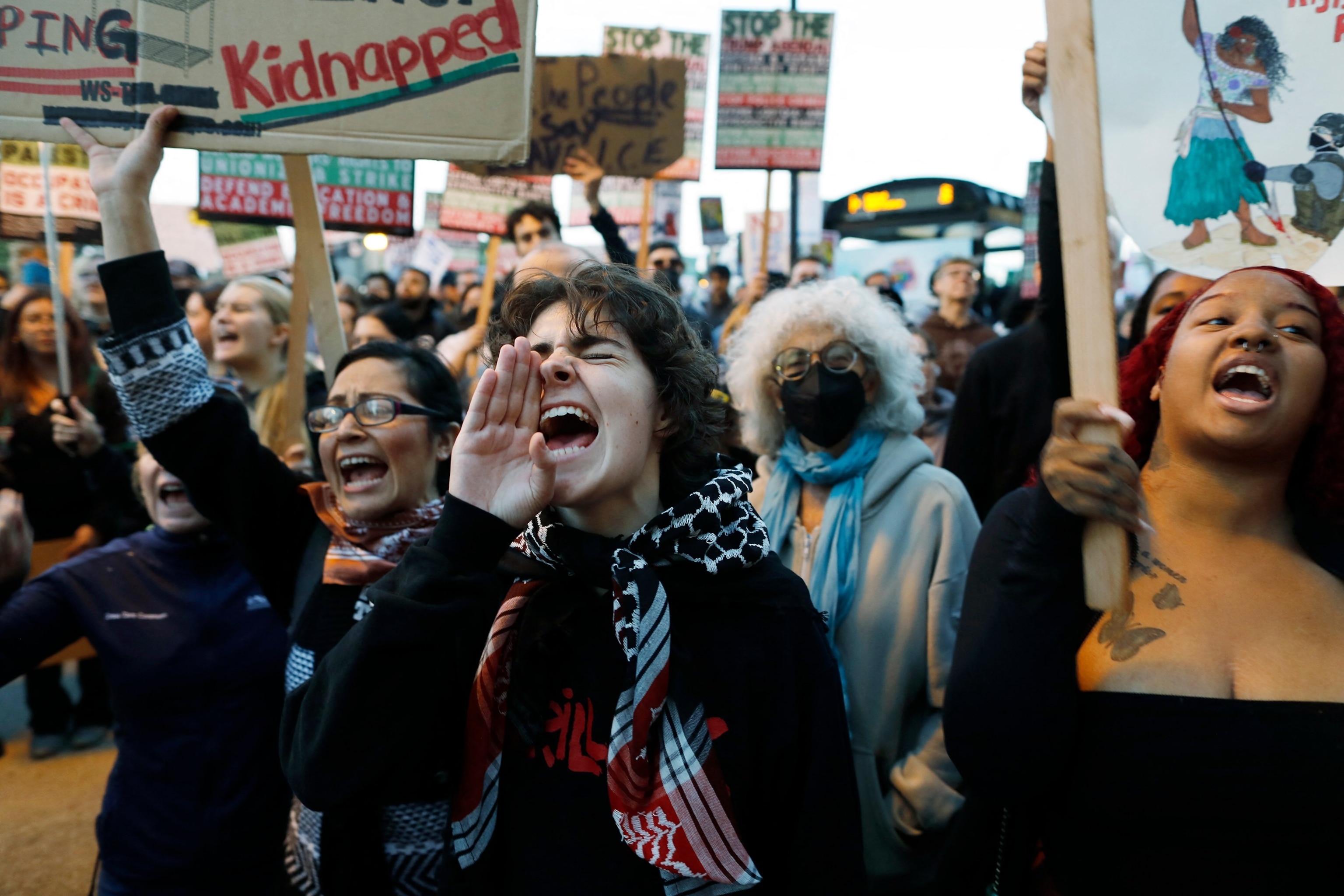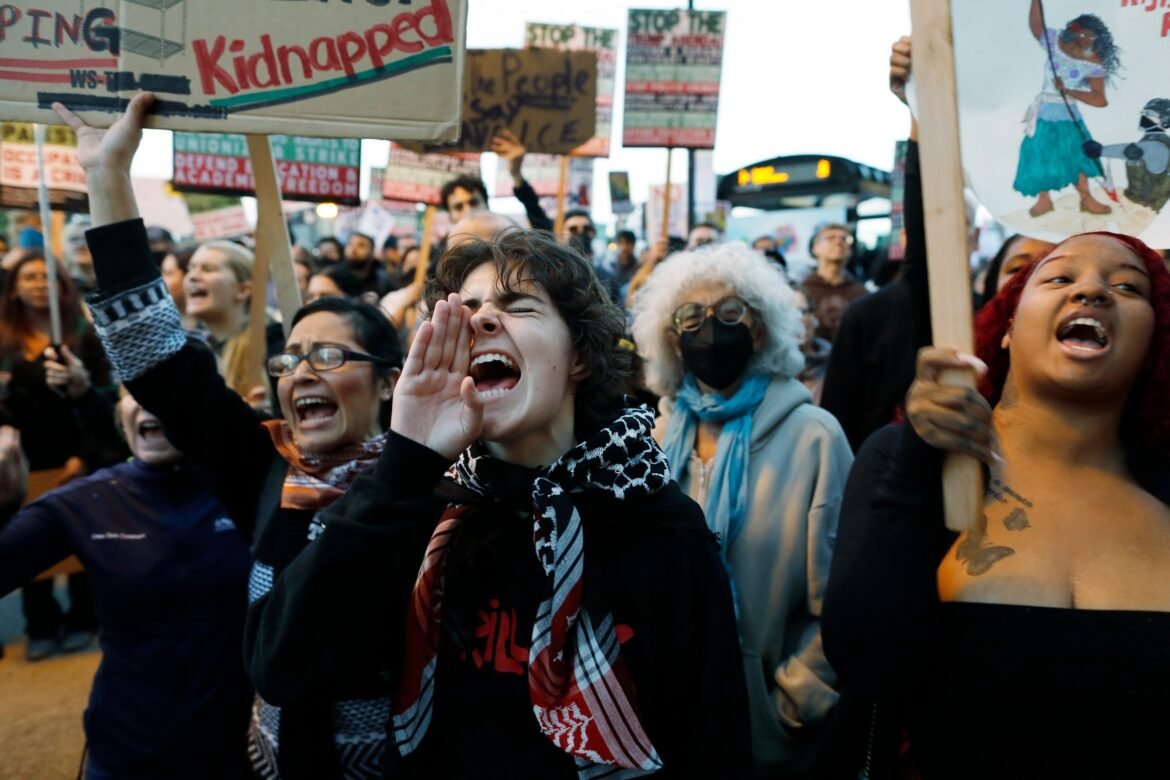In two courts in different parts of the country, President Donald Trump’s attempt to send troops to Democratic-led cities faced a critical legal test Thursday, when a Chicago judge temporarily blocked the deployment.
District Judge April Perry introduced a TRO prohibiting the deployment of National Guard troops from any U.S. state to Illinois. This sentence will be valid for 14 days.
Meanwhile, the Ninth Circuit Court of Appeals held a heated hour-long oral argument over whether to raise a lower court order blocking the deployment of troops in Portland.
Thursday’s hearings set the stage for one of the highest-profile legal battles since Trump took office, as local governments turn to the courts to stop what some judges have described as a blurring line between military and civilian rule.
chicago
Before Judge Perry’s decision, Illinois attorney Christopher Wells took aim at the Trump administration’s claims that the state and city had gone rogue.
“Does the president of the United States believe there is a rebellion?” Wells asked. “And they claim that the president is incapable of executing the laws of the United States with regular forces.”
Wells called that “a bold claim” and argued that the Trump administration was exaggerating the amount of violence directed at federal agents and property and ignoring conditions on the ground.
“Where is the rebellion? Who are the rebels? Are the rebels well armed?” asked. “There is no rebellion in Illinois.”
A Justice Department attorney, Eric Hamilton, responded that the Chicago area is experiencing “blatant hostility” toward federal law enforcement agents, a “tragic lawlessness” in the city that manifests itself in hostile and violent acts against the Department of Homeland Security and ICE personnel.
Hamilton listed as examples “agitators” who had brought weapons into federal facilities and who had thrown rocks, bottles, tear gas and fireworks at federal agents, and who had blocked and impeded immigration enforcement, including surrounding ICE agents and ramming their vehicles into police vehicles.
All of which has shown, Hamilton argued, that there is an “unprecedented” and “flagrant disregard for law and order” in Illinois.
In fact, there need not be a rebellion, Hamilton argued. The danger of rebellion occurring is sufficient for the president to determine that federalization and mobilization of the guard are justified.

People shout slogans as they protest the arrival of the Texas National Guard and U.S. Immigration and Customs Enforcement agents during a demonstration in downtown Chicago, Illinois, Oct. 8, 2025. Chicago, the third largest in the country, has become the latest flashpoint for a crackdown by Immigration and Customs Enforcement agents in US that has sparked accusations of rights abuses and countless lawsuits.
Octavio Jones/AFP via Getty Images
Judge Perry questioned Hamilton at length about the scope of the Guard’s deployments and responsibilities and asked him what the limits of his authority, scope and mission were. Hamilton outlined a limited mission to protect federal personnel and property but, under repeated questioning from Perry, Hamilton refused to rule out an expansion of the mission if events warranted it.
Describing a “dynamic situation” on the ground in and around Chicago, Hamilton said “the response will be tailored to the needs” of the moment.
If the mission changes, Hamilton said, plaintiffs could return to court to file a new challenge.
Wells, the Illinois attorney, argued that the situation on the ground, particularly outside the ICE facility in Broadview, had calmed substantially since the local government and police force had instituted restrictions on protest hours and since the Illinois State Police began providing protection at the facility.
portland
As the hearing was underway in Chicago, a three-judge panel of the Ninth Circuit Court of Appeals heard arguments on whether a lower court’s order blocking the deployment of 200 federalized members of the Oregon National Guard to Portland should be lifted.
On Wednesday, the Ninth Circuit issued an administrative stay of that order to preserve the status quo while the lawsuit moves through court.
Oregon argued that the troop deployment is “part of a national campaign to assimilate the military into civilian law enforcement” and is based on “inaccurate information” about conditions in Portland.
“The almost unlimited conception of the accused [of the law] would give the President discretion to repeat this experiment in response to other ordinary, nonviolent acts of civil disobedience throughout our nation. “The public interest is served by a court order that preserves the rule of law in the face of unlawful and unprecedented executive action that threatens serious and irreparable harm to our State and Nation,” the state’s attorneys said in a recent filing.
On Sunday, a federal judge expanded his order to bar any state’s National Guard from entering Portland after concluding that the Trump administration was attempting to circumvent his temporary restraining order by using troops from other states.
That second order has not yet been formally appealed, although the broader issue may arise during the hearing when the Trump administration challenges judicial limits on the president’s authority to deploy the National Guard.
“Congress did not impose these limits on the President’s authority to federalize the Guard, nor did it authorize federal courts to question the President’s judgment about when and where to call up the Guard to reinforce regular forces in response to sustained and widespread violent resistance to federal law enforcement,” Trump administration lawyers wrote in a filing earlier this week.
In an amicus brief filed Thursday, a group of former secretaries of the Army and Navy, retired four-star admirals and generals encouraged Judge Perry to express caution about the broader use of the National Guard in domestic operations.
“National deployments that do not comply with [the Posse Comitatus Act] threaten the Guard’s primary national security and disaster relief missions; placing deployed personnel in difficult situations for which they lack specific training, thereby raising safety concerns for both service members and the public; and risk inappropriately politicizing the military, creating additional risks to recruitment, retention, morale, and force cohesion,” lawyers for the former military leaders wrote.

